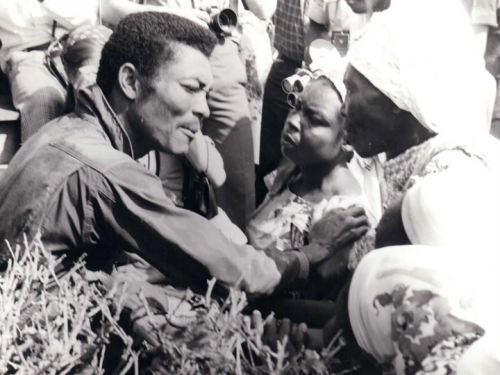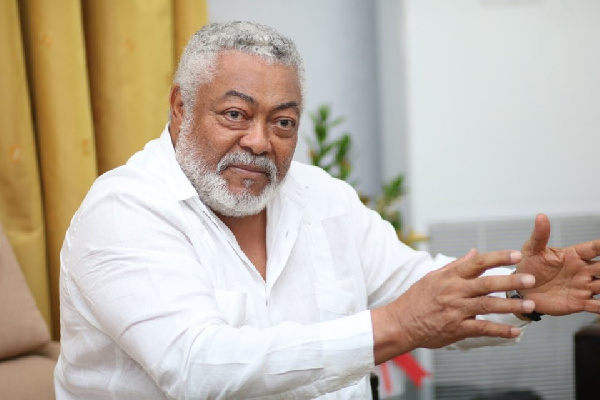‘I never lacked vision’ – Rawlings lists achievements in response to Ahwoi book
Former President J.J. Rawlings has responded claims in Prof Kwamena Ahwoi’s latest book that the country’s leader for 19 years had no clear strategy on how to develop Ghana.
To the contrary, Rawlings who led Ghana from December 1981 to January 2001, said he “has always seen his vision and legacy as a collective one that he hopes each of the dedicated patriots also recognizes as their own legacies as well.”
In the 262-page book titled ‘Working with Rawlings, Prof Ahwoi, painted the picture of Rawlings as a leader who relied more on his charisma than paying attention even at cabinet meetings.
“In my encounters with him at PNDC meetings and at cabinet meetings, I could tell that he did not understand many of the technical issues that used to be debated. Often times, he would feign disinterest and be looking through the window or playing with his toy planes,” Prof Ahwoi wrote.
He also claimed that the former President of failing to originate ideas for the transformation of the country, and relied solely on technocrats for the generation and implementation of ideas.
“But once he got a sense of direction of the meeting, he would jump on board and ensure the implementation of the decision or the policy”, Prof. Ahwoi added.
But the former President in a statement rebutting claims in the book said Rawlings’s tactics was that an effective leader.
“It is said, that it is an effective leader that consults with and participates in the backbreaking work of development, but most importantly trusts in the craft, talent and skills of his team to deliver on his and their collective vision.
The statement said the former President had never shied away from admitting that he was the leader of a team.
“President Rawlings has always stated publicly and unapologetically that throughout his tenure, he served his nation with a team comprised of various experts with different political affiliations each of whom patriotically contributed their talent and intellect to the cause,” the statement said.
Rawlings burst to the political scene as a young military officer who failed to topple the Supreme Military Council II on May 15, 1979.
But with the supported of his peers he broke out of a guardroom while and staged the June 4 coup which ousted General F.W Akuffo.
After handing over power to Limann’s administration after election in September that year, Rawlings returned two years later to topple the civilian administration on 31st December 1981.
The statement recalled Rawlings early days and how it shaped his vision for the country.
“As a young Air Force officer (in his twenties) who used to fly across the country, former President Rawlings came face-to-face with some stark realities across the country. He and his pilot colleagues would sometimes go to local markets in places like Yendi to purchase some local produce.

“He noticed old men selling beans, sorghum etc. and placed close to their legs were containers with a brown looking fluid. He was shocked to the core when on enquiry, he would be informed that the dirty looking fluid was their drinking water.
“He felt pained knowing that folks in the urban areas were so privileged that they were able to flush their toilets with clean water from the taps while those in the rural areas drank Guinea-worm infested water. Accept it or not, this was our reality as a nation. How could these experiences not have sparked a vision or a philosophical outlook in this young pilot’s head?” the statement quizzed.
Even more disturbing the statement said was that large patches of the country were without electricity.
It insisted that Rawlings no doubt had a grand vision for Ghana which he worked with people described as patriots to achieve.
The list includes:
- The next step in his vision for development was the construction and equipping of regional hospitals across the entire country. Indeed, in the early days (1980s) there was a time when Dr. Joe Abbey informed Flt. Lt. Rawlings that drugs for Government-run hospitals could not last for a week. A most shocking situation! At the time, historical records will clearly show that support from Eastern bloc countries who could be considered natural allies was not forthcoming owing to their own internal challenges. With the urgent need to complement much-needed social development projects, the PNDC Government had no option but to go West to the International Monetary Fund (IMF) and the World Bank, where we as a Government and a nation made history by defining our financial needs, terms and method of implementation to those institutions; leading to a complete overhaul in the way the IMF and World Bank approached project funding and implementation globally.
- Institution of a local government structure, a clear empowering process that has successively been embraced by all Ghanaians irrespective of political affiliation; And credit must go to patriots such Dr. Ayirebi Acquah and Madam Joyce Aryee and several others who played a significant role in implementing the policy.
- The Rural Electrification Project that ensured that most parts of Ghana were provided with electricity, recognizing the benefits that provision will add to socio-economic development;
- Prior to the era of Rawlings, travelling from Southern Ghana to Northern Ghana took days. After major roads were constructed to link most parts of the Northern Regions to the South half of Ghana, we became one unified country not just in name but also accessibility.
- Championing of women’s development and affirmative action. The results are there for all to see. Nana Konadu Agyeman-Rawlings and the 31st December Women’s movement, were instrumental in agricultural the country’s agricultural development, trade and the development of many of Ghana’s health facilities.
- With food security a priority for Rawlings, agricultural policies were initiated that resulted in the recognition of Ghana’s food production growth of 148 percent for the period 1995-1997 as “the third highest achievement in the record after Jordan (157%) and China (156%)” in the World Bank’s 1999-2000 Development Report.
- The introduction of sustainable economic policies that led to:
- Increased productivity in export produce like cocoa and gold;
- The establishment of the National Development Planning
Commission; - The revival of the Ghana Export Promotion Council, all institutions which have survived to date.
- There were massive developments in the health sector including:
- The establishment of the Cardiothoracic Centre at the Korle Bu Teaching Hospital
- The establishment of the Korle Bu Radiotherapy Centre
- The wooing of eminent personalities such as Professor Frimpong Boateng to return to Ghana to serve their country.
- The Reconstructive Plastic Surgery and Burns Centre was also constructed under President Rawlings’ watch.



